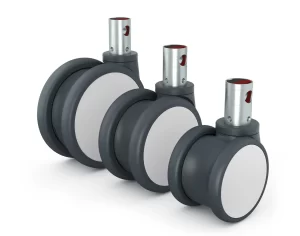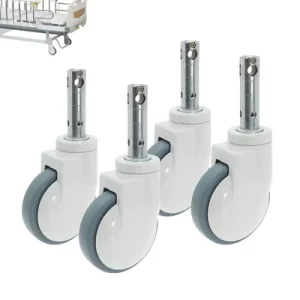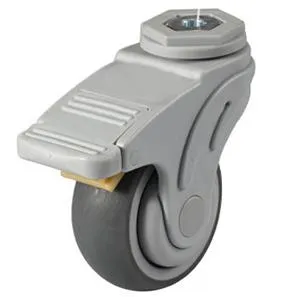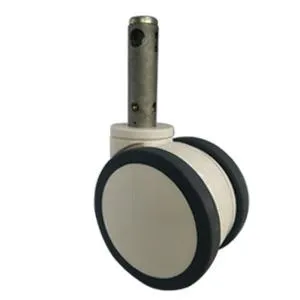The Complete Guide to Hospital Bed Casters: HENYUAN Medical Caster Solutions
In the healthcare industry, every detail counts toward ensuring patient safety and operational efficiency. One often overlooked yet essential component is the hospital bed caster. These wheels provide mobility, stability, and ease of use for hospital beds, nursing care beds, pediatric beds, ICU units, and home care setups. Selecting the right hospital bed casters directly impacts patient safety, staff efficiency, and the longevity of hospital equipment. In this comprehensive guide, we cover HENYUAN medical caster solutions, technical specifications, real-world applications, installation and maintenance tips, and a detailed selection guide.

Why Hospital Bed Casters Are Essential
Hospital bed casters are not just wheels—they are engineered medical devices that carry patients safely, reduce staff strain, and adapt to hospital environments. Key reasons they are essential include:
Patient Safety: Prevent accidental movement of beds during procedures or transfers.
Staff Efficiency: Smooth casters reduce the effort required to move heavy hospital beds.
Floor Protection: Specialized materials prevent damage to tile, vinyl, and hardwood floors.
Durability: Designed for long-term use under heavy loads, withstanding daily hospital operations.

Types of HENYUAN Medical Casters
1. Swivel Casters
Swivel casters rotate 360° for excellent maneuverability, ideal for ICU beds, emergency rooms, and pediatric units.
Technical Specifications:
| Feature | Specification | Notes |
|---|---|---|
| Diameter | 4–6 inches | Suitable for hospital and home care beds |
| Load Capacity | 200–350 kg per caster | Handles patients plus equipment |
| Material | Polyurethane or Rubber | Non-marking, smooth on hard floors |
| Locking | Optional individual or central lock | Prevents accidental movement |
| Noise Level | ≤ 35 dB | Quiet for patient comfort |
Real-World Application:
In a busy ICU, beds are frequently repositioned for treatment and monitoring. Installing HENYUAN swivel casters allows nurses to move beds smoothly, reducing staff fatigue and preventing patient discomfort.
2. Fixed Casters
Fixed casters provide stability and directionality. Usually installed at one end of the bed, they complement swivel casters.
Use Case:
Recovery rooms benefit from HENYUAN fixed casters to maintain bed alignment, especially on smooth floors where unintentional movement can occur.
Example: A pediatric hospital ward installed fixed casters on the foot end of beds, preventing lateral drift and ensuring beds stayed in place during playtime or repositioning.

3. Locking Casters
Locking casters are crucial for patient safety, preventing beds from rolling accidentally. HENYUAN offers:
Central Lock Casters: Engage all wheels simultaneously.
Individual Lock Casters: Allow selective locking of specific wheels.
Case Study:
A hospital replaced standard casters with HENYUAN central lock casters on 300 beds. The result was a 30% reduction in accidental bed movement incidents, significantly improving patient safety.
4. Antimicrobial & Antistatic Casters
These casters are essential in high-risk environments such as operating rooms and ICUs. Antimicrobial HENYUAN casters reduce microbial contamination, while antistatic casters prevent interference with sensitive medical equipment.
Case Study:
A surgical ward using antimicrobial casters reported a measurable decrease in bacterial contamination on mobile beds over six months.
Technical Specifications Overview
| Caster Type | Diameter | Load Capacity | Material | Locking | Special Features |
|---|---|---|---|---|---|
| Swivel | 4–6 in | 200–350 kg | Polyurethane/Rubber | Optional | 360° rotation, quiet operation |
| Fixed | 4–6 in | 200–350 kg | Polyurethane/Rubber | Optional | Stability, directional control |
| Central Lock | 4–6 in | 250–350 kg | Polyurethane/Rubber | Central | Lock all wheels simultaneously |
| Individual Lock | 4–6 in | 200–350 kg | Polyurethane/Rubber | Individual | Selective locking |
| Antimicrobial | 4–6 in | 200–350 kg | Polyurethane | Optional | Reduces bacteria, safe for surgical wards |
| Antistatic | 4–6 in | 200–350 kg | Polyurethane | Optional | Prevents static interference |
Selecting the Right Hospital Bed Casters
Selecting hospital bed casters requires considering bed type, patient weight, floor surface, and special needs.
Selection Guide:
| Bed Type | HENYUAN Caster Recommendation | Diameter | Load Capacity | Locking | Floor Type |
|---|---|---|---|---|---|
| ICU | Swivel + Central Lock | 6″ | 350 kg | Central | Tile, Vinyl |
| Standard | Swivel + Fixed | 5″ | 250 kg | Individual | Vinyl, Wood |
| Pediatric | Swivel | 4″ | 200 kg | Central | Wood, Carpet |
| Home Care | Swivel | 5″ | 200 kg | Optional | Hardwood, Vinyl |
| Bariatric | Heavy-Duty Swivel + Lock | 6″ | 350–400 kg | Central | Vinyl, Tile |
Practical Tip:
Check the bed and caster compatibility with floor type. For hardwood floors, use soft rubber or polyurethane HENYUAN casters to prevent scratches.

Maintenance and Installation Tips
Proper installation and maintenance ensure longevity:
Installation: Verify stems are fully inserted and locking mechanisms function.
Cleaning: Use hospital-grade disinfectants; antimicrobial casters reduce bacterial growth.
Inspection: Examine for wear, cracks, or loose hardware every 3–6 months.
Replacement: HENYUAN replacement casters maintain consistent performance and compliance.
Pro Tip: Always label fixed casters’ positions during installation to prevent incorrect placement.
Real-World Applications
Emergency Departments: Swivel casters allow rapid bed repositioning during codes.
ICU Units: Central lock casters prevent bed movement during critical procedures.
Pediatric Wards: Small-diameter, quiet casters reduce noise and maintain safety.
Home Care: Smooth polyurethane casters protect floors while providing easy movement.
Surgical Rooms: Antimicrobial and antistatic casters reduce contamination risk.
Case Example:
A metropolitan hospital installed HENYUAN swivel + central lock casters on 500 beds. Results included faster patient transfers, reduced staff strain, and a 25% drop in bed-related incidents.
FAQs About Hospital Bed Casters
Q1: How do I know which diameter is right?
A: Consider bed type and floor surface. ICU beds often require 6″ casters; home care beds can use 4–5″.
Q2: How often should casters be inspected?
A: Every 3–6 months for wear, cracks, or loose hardware.
Q3: Can I replace standard casters with HENYUAN medical casters?
A: Yes, HENYUAN offers compatible replacements for most hospital and home care beds.
Q4: Are antimicrobial casters necessary?
A: They are recommended in ICUs, surgical wards, and isolation units to reduce infection risks.
Conclusion
Hospital bed casters are a critical component of hospital operations. Choosing HENYUAN medical casters ensures safety, reliability, and efficiency across ICU beds, pediatric wards, home care, and surgical units. From swivel and fixed casters to central lock and antimicrobial options, HENYUAN offers a complete solution to meet every hospital need.
Investing in high-quality hospital bed casters improves patient safety, reduces staff fatigue, protects floors, and ensures durable, long-lasting mobility solutions.
For hospital bed caster, hospital bed caster wheels, wheels for hospital bed, or wholesale hospital bed on wheels, Henyuan Medical Caster ensures reliability, safety, and efficiency for every healthcare facility.
If you want more medical spare parts,you can visit our other website: medicalfurnitures.com
